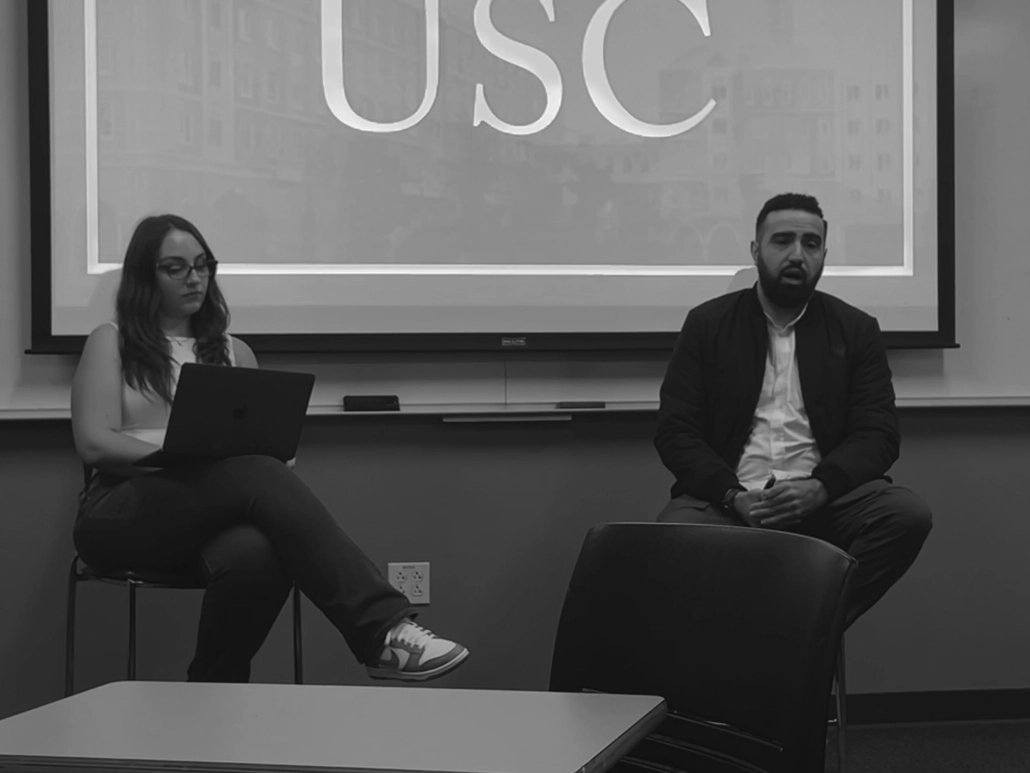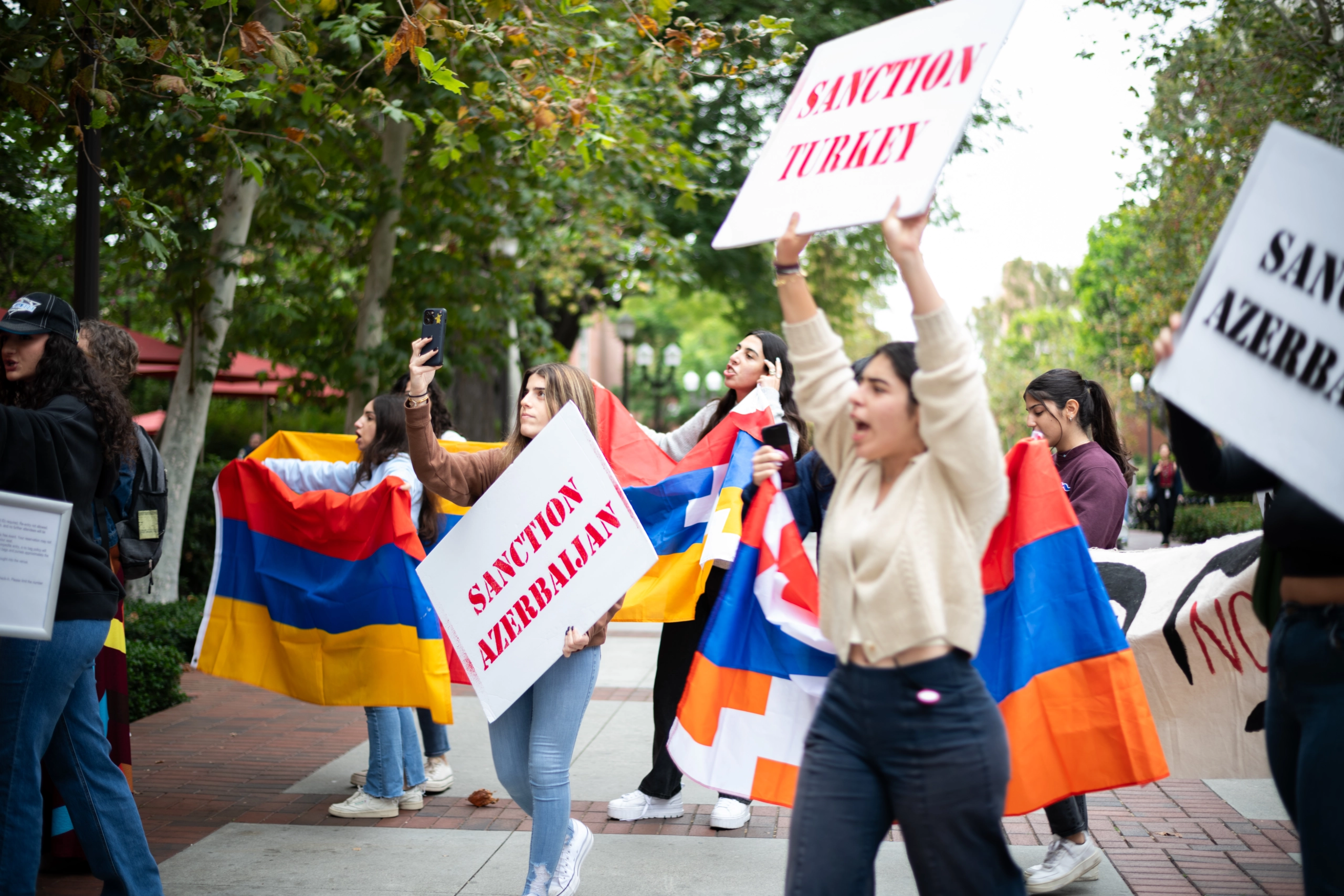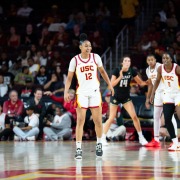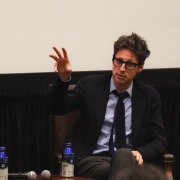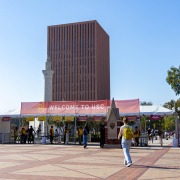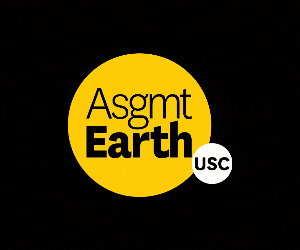Gev Iskajyan, executive director of the Armenian National Committee of America in Artsakh, spoke at USC about his time living under a monthslong humanitarian blockade of the breakaway state, and being forced to flee.
On a chilly Thursday evening, Gev Iskajyan made his way down to the basement of the Social Sciences Building, rocking a sharp-cut beard, a thin padded sweater over a button-down, and slacks. He had arrived some 15 minutes behind schedule; that was just Armenian time, Mané Berikyan, vice president of the USC Armenian Students’ Association, told me, laughing. Indeed, some 30 people who had come to hear Iskajyan speak — mostly Armenian students from USC, UCLA and California State University, Northridge — had filed in just a few minutes before him.
Had I not read the flier for this event, I would never have known this was someone who had lived through an ethnic-cleansing campaign against the Republic of Artsakh, as Armenians call the now-dissolved state of Nagorno-Karabakh, just barely two months ago. When Iskajyan entered the room, he was talking with Berikyan wearing a beaming smile on his face.
Iskajyan is a Los Angeles native — a fact that became immediately obvious that night when he said, of living in Artsakh: “It was dope.” He is a diasporan Armenian who has long been involved with advocacy work: As a member of the All-Armenian Student Association board in 2015, he helped lead a movement that, two years later, successfully convinced the University of California system to divest $74 million worth of bonds issued by the Turkish government, which has continued to deny the existence of the 1915 Armenian Genocide. He also served in the Armenian Revolutionary Federation — an Armenian nationalist and socialist political party, known for helping establish the first Armenian Republic in 1918 — as a member of its Central Committee of the Western United States.
But in the last two years, he has taken on somewhat of a different role, as he was stationed in Artsakh as the executive director of its Armenian National Committee of America chapter. Whether he liked it or not, he emerged as one of the only English-language sources of news in the republic as Azerbaijan, backed by Turkey, blockaded it for 10 months beginning in December 2022 — refusing to allow in even the essentials needed for survival, never mind journalists.
Some would call his work in those years journalism, though he refuses the label; “It was a hat that we had to wear because it was born out of necessity,” he said in his talk Thursday night. He posted photos and videos on what was then Twitter — of Artsakhi civilians injured, traumatized, living in squalid conditions — braving frequent internet outages and threats of prosecution by the Azerbaijani government. He appeared on outlets like CNN, BBC and Al Jazeera, hoping to fill what was otherwise a “media vacuum,” he said. Many of those suffering, he repeatedly emphasized on what is now X, were children: “The worst thing Azerbaijan has done during this blockade is deprive 30,000 kids in Artsakh of their childhood,” Iskajyan wrote on X Sept. 17, just days before the final push that would wipe Artsakh from the map.
His time witnessing, and bearing himself, the suffering of the Artsakhi people in those years was what I had gathered to be the subject of the talk. But throughout the hour or so that he spoke — answering questions from Berikyan, who moderated, and from members of the audience — his overarching message was of hope and resilience.
“There’s so many ways that the apparatus, the society should have [fallen] apart,” Iskajyan said. But in such times of crisis, the people of Artsakh bonded ever closer together: “Everyone’s just taking care of each other. That mindset that we move forward with is incredible. There was never a time where, even if we didn’t have anything, there’s like a state of panic that something bad’s gonna happen.”
With Artsakh goes a part of my soul. pic.twitter.com/A8stIOxbWu
— Gev Iskajyan (@geviskajyan) September 29, 2023
Even as he described unimaginable horrors — dozens of refugees dying while crossing the Lachin Corridor to escape Artsakh; some 200 people killed in a fuel tanker explosion (estimates vary widely); incessant shelling and bombing, followed by machine-gun fire from “a street or two away”; farmers forced to leave their entire livestock and livelihood behind — he found a way to shine a positive light on it. Amid the chaos of Azerbaijan’s two-day military campaign, emergency aid and medical services had all but vanished, so Artsakhi people came together to establish their own makeshift services. “We would create a phone list of numbers,” Iskajyan said. “We would send a guy there, give him like 10 phone numbers, saying, ‘Look, if someone calls for an ambulance, call this number. This guy’s gonna go pick them up.’”
Those moments of resilience against all odds instilled “a lot of pride in who these people are,” he said.
A few days after Iskajyan and over 100,000 ethnic Armenians were forcibly displaced from Artsakh, the Annenberg School for Communication and Journalism hosted Hasan Murat Mercan, the Turkish ambassador to the United States, and Ramil Gurbanov, the consul general of Azerbaijan in L.A., to speak at Annenberg Hall. The announcement of the event elicited an uproar from Armenians at USC and beyond. Mercan was “known for directly upholding Turkey’s policy of Armenian Genocide denial,” a joint statement from the American Youth Federation — Western U.S., All-ASA and USC ASA read; not only that, the timing of the event during an ongoing ethnic-cleansing campaign was “extremely insensitive” at best and “extremely dangerous” at worst. When Annenberg proceeded with the event as scheduled, some 50 protesters surrounded the building, leading to a lockdown and physical spats with law enforcement. (USC has since apologized for hosting the event — but only privately to L.A. City Council president Paul Krekorian, who had penned an enraged letter to President Carol Folt.)
RELATED
Letters between USC and LA officials unveil aftermath of Türkiye Conference
November 7, 2023
When I spoke to Berikyan — the USC ASA vice president — the day before Iskajyan’s talk, she recalled the chaos of that week with a pain that still seemed fresh.
“To have had to be out there, early in the morning on a Friday, to be protesting our own University platforming genocide denial — as we were witnessing genocide take place against our people — it was just very hurtful and also just very disheartening to see,” Berikyan told me.
Long before the Annenberg event, Berikyan and USC ASA had been hosting their own events, panel discussions and crisis briefings — “to make our presence known, to make our value known,” Berikyan said.
“We’ve been putting in the work, we’ve been taking care of our own community,” she said. “To see our University not acknowledging our pain, but then also [proceeding with the event], it was obviously very hurtful and a huge slap in the face. And many students still feel betrayed.”
But Berikyan refused the notion that the incident would in any way define or motivate USC ASA’s future advocacy work.
“We were always unified. And we’ve always put in the work,” she said. “We’ve always been our most staunch advocates and will continue to be.”
Indeed, USC ASA continued as planned, working with All-ASA to line up a series of events for Artsakh Awareness Month — which would end with Iskajyan’s talk as a closer.
This was the first time Iskajyan had been back home in years. He had initially planned to leave last December — but then the blockade happened, Haig Minasian, a close friend of his, told me.
“He’s one of those fellows of ours that, when — excuse my language — shit hit the fan, he went out straight to where the shit is,” said Minasian, who works as a geospatial data analyst and census project coordinator. “I was worried that my friend wasn’t gonna get out of there … So I was very, very happy to hear when he did get out.”
On Tuesday night, he finally returned home to Los Angeles, almost a year later; and he had agreed to make a stop at USC to speak. But mostly, he was here to reunite with family and friends, and “recharge,” as Minasian put it.
“He’s one of the first ones back to get to tell this story,” Minasian said. “So this is just an exceptional opportunity.”
Iskajyan had only a few requests of the Armenians in the audience: to step foot on Armenian soil, if they could, and see for themselves “what it is we’re fighting for and where we’re going”; and to fight for the Armenian cause in any way they were able.
“No one’s going to make sure that you can call Armenia home for the next 100 years. That’s gonna be all on us,” Iskajyan said. “Everyone sees us through the prism of their interests … That’s the reality of the world’s politics. The only people that have Armenia’s interests at heart are us.”
The talk ended, and the rest of the crowd had dispersed to socialize over Krispy Kreme donuts. I was thinking about what Berikyan and Minasian had told me in our Zoom call: that before Artsakh was the site of abject horror, it was a vibrant society, with schools, universities and public works — just as any other place where peaceful people lived.
“We’re more than just survival,” Berikyan had said. “But for the time being, if telling our stories of survival is what it takes to get recognition, then that’s what we’ll keep doing.”
I approached Iskajyan and told him my thoughts. I was not Armenian, I told him, as if that wasn’t plainly obvious. I would only really see places like Artsakh — or Gaza, or Iraq — in times of war or crisis, when they would then appear on the news as scenes of unspeakable devastation and suffering. I asked what he would say to people like me.
“It’s not just what we see on CNN that matters,” Iskajyan told me. He touched my arm with his hand before each sentence, as if to physically instill upon me every word he was saying. “It’s every people that are fighting against injustice. Everyone that’s going through oppression matters.”
As a U.S. citizen, he said, he was especially concerned with what he saw as the hypocrisy of American foreign policy — asserting Ukraine’s right to self-determination, for example, but staying silent on Artsakh. (The United States did not formally recognize Artsakh as a state.)
“Does the United States genuinely believe that they’re fighting against injustice?” he asked. “Or do we not apply that everywhere, and we only apply that where it’s politically convenient? So the way that we as a country look at, and react to, these issues defines who we are and what we stand for.”
He mentioned no other specifics, but somehow I knew exactly what he was talking about. ❋


